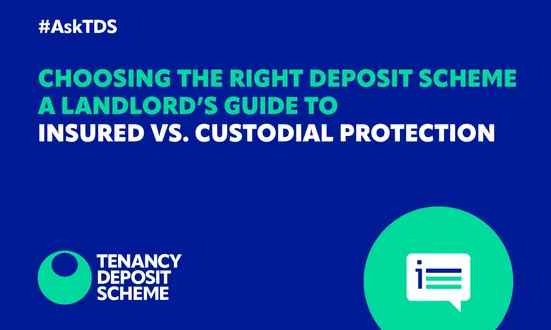Renting out a property for the first time can be a daunting prospect. Between understanding your legal obligations, choosing a suitable deposit protection scheme, and learning how to prevent potential disputes, starting on the right foot is essential. That’s where the Tenancy Deposit Scheme comes in. Here are our expert tips to help guide you on what you need to know as a new landlord.
- For any new tenancy, you must register the deposit within 30 days of receiving it, or within 30 days of the tenancy becoming an assured shorthold tenancy, if this occurs after you receive the deposit.
If you don’t meet the above requirements, a tenant will be able to make a claim through the courts for the full deposit and a penalty of between one and three times the value of the deposit. - Your tenant (and every ‘relevant person’ who has contributed to paying the deposit) must be given the prescribed information within 30 days of you receiving the deposit, or within 30 days of the tenancy becoming an assured shorthold tenancy, if this occurs after you receive the deposit.
You will find the prescribed information in our document “Prescribed information and suggested clauses for tenancy agreements and terms of business“. - When providing your tenant with the prescribed information, ask them to sign if possible. If you don’t provide the tenant with the prescribed information in time, they could start court action for compensation.
- Provide your tenant with a detailed inventory at the beginning of the tenancy and get them to sign it in agreement. The inventory should include a schedule of condition at check-in and check-out, and can be printed or digital. Inventories often include photography to supplement the written statement, or in some cases, video clips.
- If there are any changes during the tenancy, update all the records and documents including the tenancy agreement. Your deposit protection scheme should be advised of any changes in ownership or management.
- If you are experiencing mid-tenancy disputes, TDS Resolution offers a free and impartial mediation and coalition service to help landlords and tenants resolve disputes and maintain the tenancy. The confidential service is available for landlords, agents acting on their behalf, and tenants. We can assist with issues such as repairs, entry rights, rent arrears and breach of tenancy terms.
- At the end of a tenancy, if there is no dispute and you hold the deposit, release the deposit within 10 working days. If the Tenancy Deposit Scheme holds the deposit and the parties agree, the deposit is released within 10 working days.
- If there is a dispute, try to communicate with your tenant first. Many disputes could be resolved before reaching adjudication by simply talking to each other and discussing the complaint, to see if an agreement can be reached. Our Deposit Deductions template has been proven very effective in outlining the deductions you wish to make, and coming to an agreement.
- If you can’t reach an agreement, and you hold the deposit, you must send the Tenancy Deposit Scheme the disputed amount. No matter which scheme you are with, you can make use of our free alternative dispute resolution service where an adjudicator decides how the deposit should be repaid.
- It helps to know that we base our dispute outcomes on the information we receive, so ensure that you include the check-in and check-out inventories and condition reports, as well as any photographs, relevant invoices and receipts. If you are claiming for rent arrears, send us a schedule of what’s been paid and what hasn’t – along with the rent due dates. The documents provide evidence that any property damage or rent arrears are the tenant’s responsibility.
Deposit Protection for Landlords
We provide a free Custodial tenancy deposit protection scheme, or join our Insured tenancy deposit protection scheme, which offers the best rates for agents and landlords.
Protecting deposits with TDS is quick and easy.
Other news stories

Choosing the right deposit scheme: A landlord’s guide to Insured vs. Custodial protection
As a landlord, protecting your tenant’s deposit is not just good practice, it’s a legal requirement. Since 2007, landlords must...
Read more

TV property guru Sarah Beeny joins NRLA conference line-up – get your ticket today
With a raft of legislation change set to turn the way we do business on its head, you can’t afford...
Read more

Why going digital with inventory and check-in reporting is no longer optional
The rental sector in the UK has been changing at a rapid rate as laws, expectations, and risks are all...
Read more